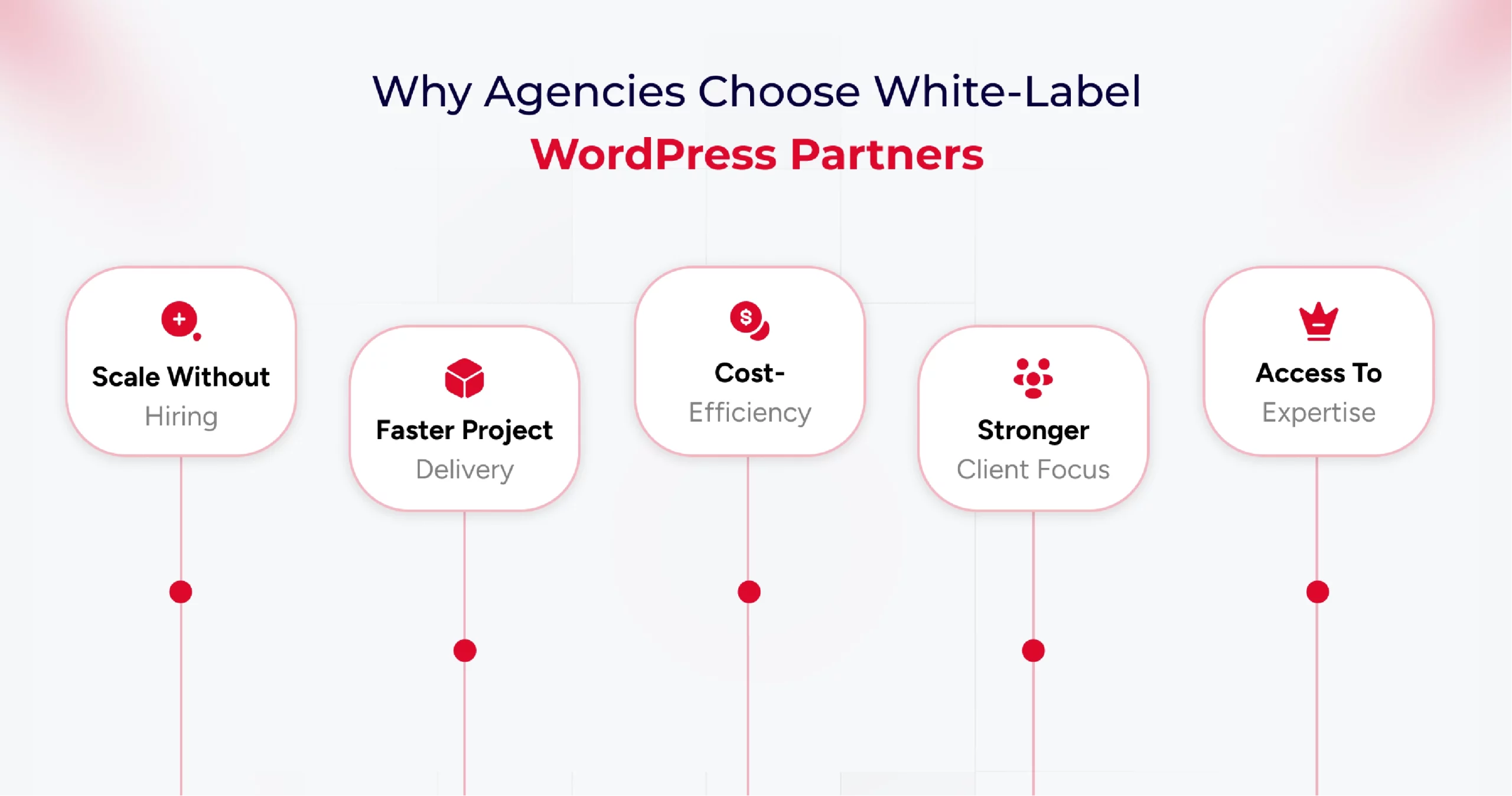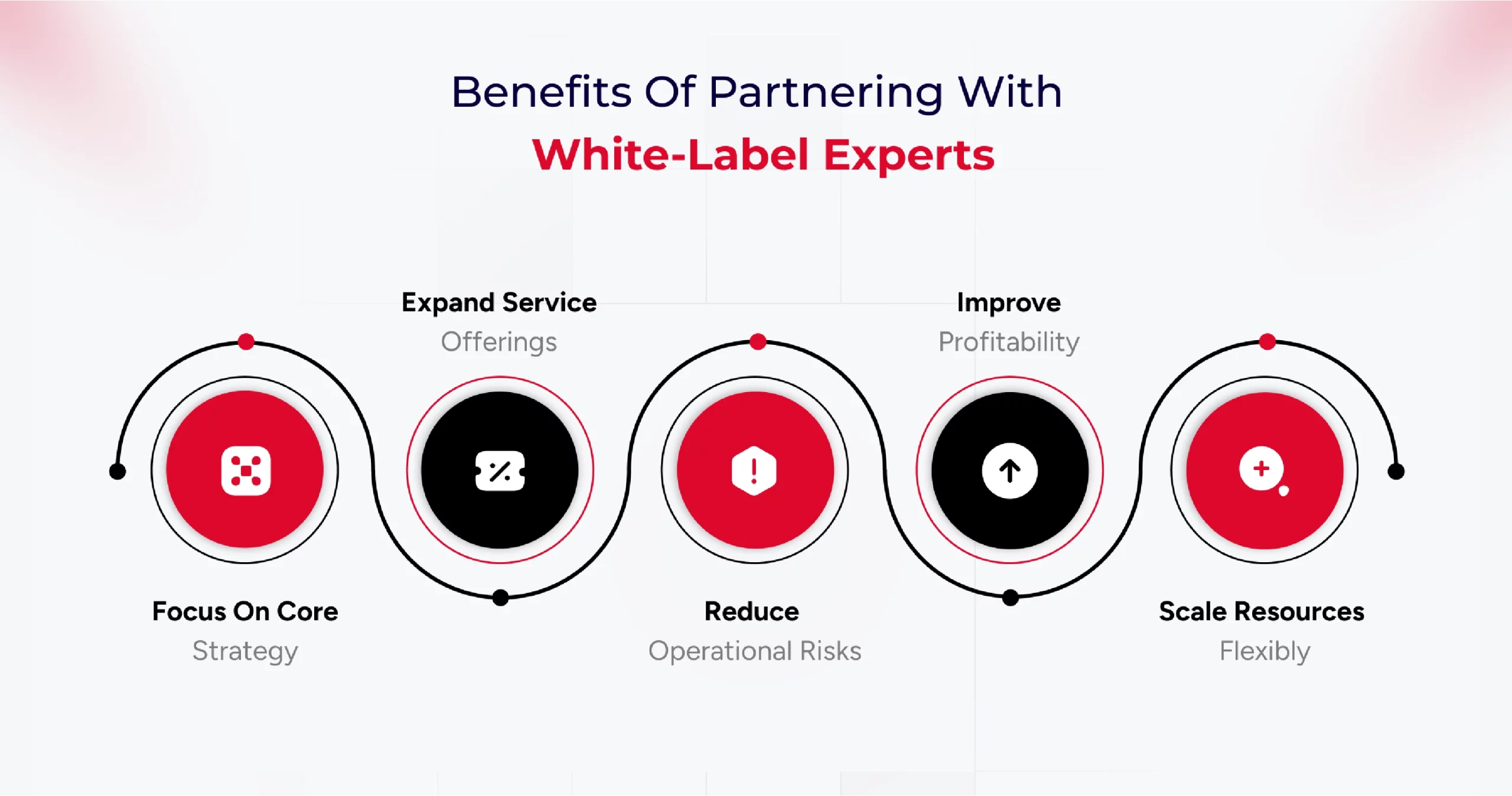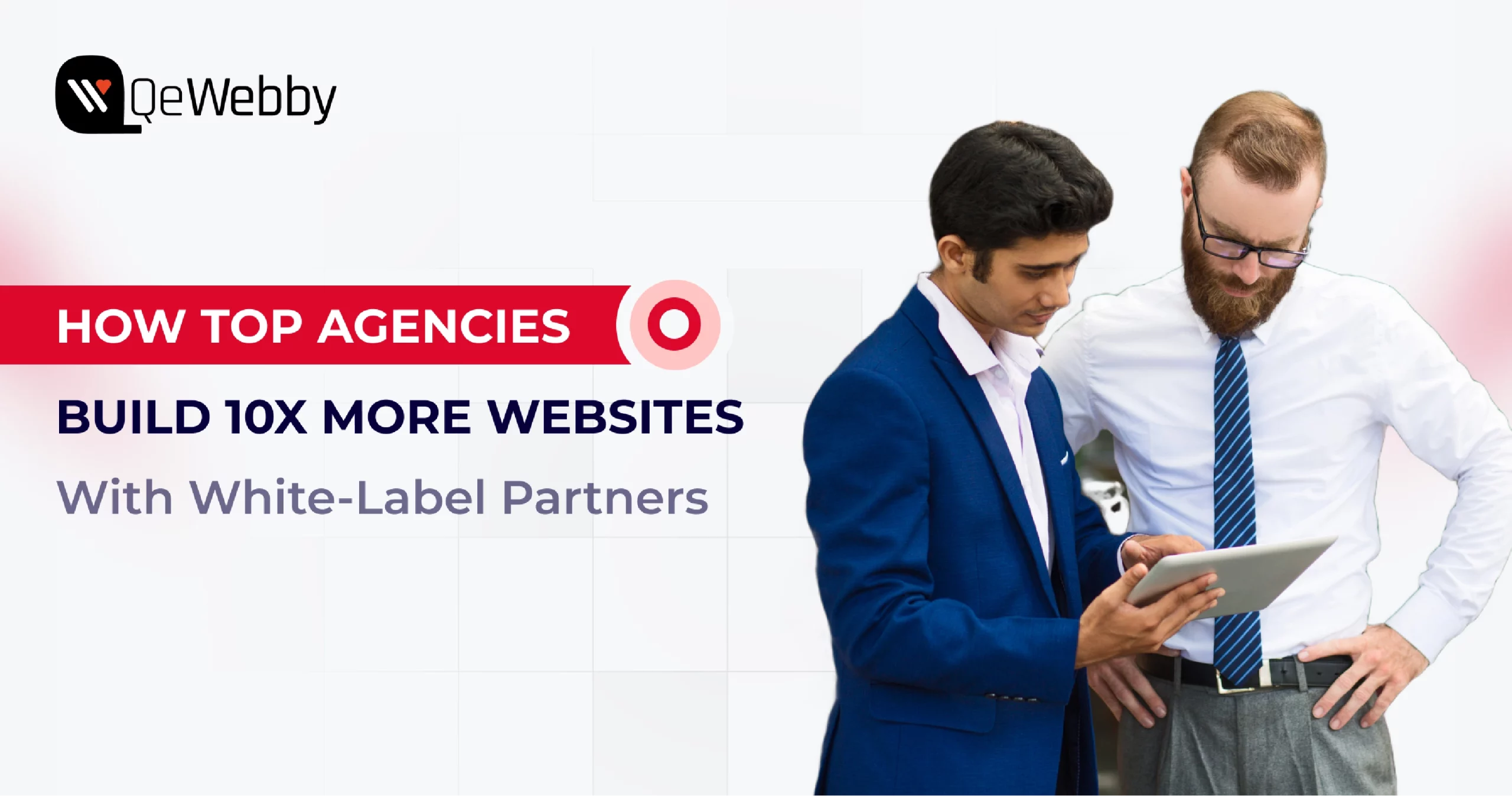Most agencies struggle at scale due to resource limitations. White-label WordPress development services can help agencies scale without spreading their resources too thin. However, finding the right white-label WordPress development agency can be a complex process.
Agencies need to evaluate development, WordPress customization, and SEO expertise. However, there are many additional aspects that an agency needs to consider before selecting a white-label WordPress development service. With 43.3% of websites on the internet now using WordPress, the demand for development expertise is also higher.
This is why many agencies face questions like
- Does investing in a white-label development service make sense?
- What are the tasks an agency can outsource?
- How does it impact SEO?
- Is outsourcing the only answer to cost reduction and scalability?
What are White Label WordPress Development Services?
White-label WordPress development services help agencies in building WordPress websites, plugins, and applications. Agencies can rebrand websites as their own. Such a partnership allows agencies to scale their services and easily expand offerings without hiring in-house staff.
What Makes White Label WordPress Unique?
White-label WordPress development offers flexibility for agencies. It ensures a custom-branded solution for agencies through outsourced development. This makes sure agencies reduce costs, simplify branding, and offer tailored solutions.
Brand Consistency Without Technical Overhead
White-label WordPress development services enable companies to deliver professional websites, ensuring consistent branding and a seamless user experience. This is particularly important if you want to ensure consistency across devices and screens.
Especially when 64.2% of total traffic comes from mobile devices, it is essential to ensure branding consistency. Agencies can outsource the technical work to specialized developers and offer sites that can be rebranded for clients.
Cost-Effectiveness and Resource Optimization
Enhanced Service Portfolio and Expertise Access
Companies can easily access specialized WordPress developers and experts. It also helps create custom themes, develop plugins, provide WooCommerce solutions, and optimize performance. WordPress outsourcing service providers employ SEO best practices, security protocols, and strategies for the site. This helps agencies ensure their clients’ visibility is higher.
While the above aspects do make white-label WordPress development unique, the real question is how it fares against the standard development approach.
The Difference Between White Label and Standard WordPress Development
Here are some key differences between white-label and standard WordPress development approaches.
| Aspect | White Label WordPress Development | Standard WordPress Development |
|---|---|---|
| Ownership | Client owns the final product; development team remains invisible to the end customer | Direct relationship between client and development team; complete transparency of providers |
| Branding | Developed under your brand name, the third-party provider remains anonymous | Development team's branding may be visible; direct attribution to developers |
| Cost Structure | Lower upfront costs; eliminates hiring and training expenses | Higher initial investment; includes whole team setup and resource allocation |
| Project Timeline | Faster turnaround due to specialized, ready-to-deploy teams | Longer development cycles include team assembly and project planning phases |
| Customization Level | Limited customization focuses on rebranding existing solutions | Full customization capabilities; complete control over features and functionality |
| Scalability | Highly scalable, easy to scale up/down based on project demands | Requires significant resource planning; scaling involves hiring and team management |
| Quality Control | Dependent on the provider's standards, less direct oversight | Direct quality control, complete management of development standards and processes |
| Communication | Indirect communication through a white label provider | Direct communication with the development team, immediate feedback loops |
| Project Complexity | Best suited for standard features and simple-to-moderate projects | Ideal for complex, highly customized solutions requiring unique features |
| Resource Management | No need for internal resource management; the provider handles team allocation | Full responsibility for team management, resource allocation, and coordination |
Why Top Agencies Use White-Label WordPress Partners?

1. Scalability without Hiring
White-label WordPress development services provide access to professionals who help agencies complete projects efficiently and deliver high-quality output. The best part is that agencies don’t need to hire these talented professionals in-house. So the cost of hiring, training, and managing talent is borne by the white-label WordPress development agency.
2. Faster Project Delivery
3. Cost-Efficiency
4. Focus on Strategy and Client Relationships
5. Access to Specialized Skills
Finding the right talent for your agency can be complex in a crowded market. Plus, if you need a specialized talent, hiring, onboarding, and ensuring the timely delivery of projects can be overwhelming. Partnering with a white-label development agency, you get access to specialized talents without the hassle of hiring them in-house.
Knowing the benefits of outsourcing to a white-label development agency leads to another crucial question: “What to outsource?” Yes, prioritizing specific tasks and operations for outsourcing is key to successful project delivery.
Top Tasks to Outsource Through White Label WordPress Providers
White-label WordPress providers ensure a range of services that you can outsource. But strategically planning the prioritization of tasks becomes essential. Here are some tasks that you can outsource to a WordPress development agency.
Custom WordPress Website Creation
As an agency, you can outsource the design and development of unique WordPress themes specific to your branding needs. It can help you customize a WordPress website for your clients based on their particular needs.
Plus, you can outsource custom plugin development to add unique functionalities and features to the website. And if you are looking to cater to an e-commerce brand, consider outsourcing WooCommerce development to a WordPress development agency.
You can also outsource website migration tasks, which allows you to seamlessly move the existing resources to newer WordPress versions or environments.
Ongoing Website Maintenance and Support
A key task to outsource is website maintenance. You can ensure higher website uptime by outsourcing the maintenance activities to a white-label development agency. These service providers continuously monitor your website and optimize it for performance based on analytics.
Using such services also ensures daily backups of your website. So, your site is always ready for recovery, even in the event of an incident. Plus, you get complete end-to-end technical support from a white-label development service provider.
SEO Implementation and Optimization
One of the most essential activities to outsource is search engine optimization. As an agency, you need to ensure maximum visibility for clients to ensure higher conversions. Plus, 53% of mobile visitors abandon pages, that take longer than 3 seconds to load. This makes outsourcing performance optimization to specialists crucial for your brand. A white-label WordPress development service helps you optimize SEO and provide better visibility.
This includes,
- SEO strategy development tailored to your client’s brand and target audience.
- Identify related keywords, ensure better AIO and GEO strategies.
- Optimize the website content, meta descriptions, titles, and images for search engines.
- Address technical aspects of a website to ensure a better site structure, improved crawlability, and enhanced mobile-friendliness.
- Implement link-building strategies to acquire high-quality backlinks from reputable websites with a high domain authority.
- Create a content strategy and develop SEO-friendly resources that can offer the target audience better value.
Benefits of Partnering with White-Label WordPress Experts

- Higher Focus on Core Competencies - Such services allow your team to focus on client relationships, strategy, and business development.
- Service Offering Expansion - You can partner with a white-label development agency to easily scale your business offerings.
- Risk Mitigation - Partnering with a white-label agency ensures a single point of contact for the client, providing a seamless experience. It offers better client loyalty and brand ownership.
- Higher Profitability - With this partnership, your agency can handle more clients and increase its profitability through reduced operational costs.
- Better Cost Efficiency - The reduced cost of recruitment, training, salaries, employee insurance, and other resources makes this partnership cost-efficient.
- Faster Time-to-Market - Experienced teams and experts from a WordPress development agency help you deliver client projects faster. It enables you to launch a new service and meet deadlines quickly.
- Better Flexibility & Scalability - Scaling your agency services becomes easier by partnering with a WordPress outsourcing service. Plus, you get better flexibility in adding resources as per project requirements.
White-Label WordPress vs Freelance Developers (Comparison Table)
| Criteria | White-Label WordPress Design & Development Team | Freelance WordPress Developer |
|---|---|---|
| Team Composition | Multi-skilled team covering development, design, SEO, project management, and ongoing support | Solo expert focuses on their core skills, may specialize in a niche |
| Scalability | Highly scalable, can handle multiple projects and increased workloads efficiently | Limited capacity is restricted by individual bandwidth and availability |
| Backend Support for Agencies | Robust WordPress backend support; acts as a silent, invisible partner behind agency branding with long-term updates, troubleshooting, and security | Often limited to core development, ongoing WordPress support depends on the freelance arrangement |
| Branding Opportunities | Enables agencies to offer white-label, branded services; clients see only agency brand | Works under their own name; agency branding requires a special arrangement |
| Expertise Coverage | Comprehensive covers design, speed optimization, plugin/theme customization, hosting, security, and maintenance | Variable—may be deep in specific areas (e.g., WooCommerce, custom plugins), but broad coverage is often lacking |
| Cost Structure | Higher upfront cost, but billed per actual work delivered; better cost efficiency for ongoing and larger projects | Budget-friendly for small projects, flexible payment, and often lower overall costs |
| Project Management | Dedicated account/project managers streamline workflow, communication, and deadlines | Direct communication and feedback; management handled personally by the freelancer |
| Support & Maintenance | Ongoing reliable WordPress backend support for agencies; regular updates, security, and fixes | Support may be limited; post-project support depends on the freelancer’s availability and preferences |
| Availability | Consistent—team approach ensures resources are deployed as needed | Variable; freelancers may juggle multiple projects at once, affecting responsiveness |
| Delivery Consistency | Quality assured with standardized workflows and quality checks | Personalized service but variable consistency; may lack process rigor |
| Flexibility | Can rapidly shift resources between projects as agency needs change; offers agency-focused customization. | Maximum flexibility in hours and approach, direct negotiation possible |
How to Choose the Right White-Label WordPress Partner
Essential Qualities to Look For in a Partner
- Technical Expertise: Seek partners with a specialized team, proficiency in WordPress technologies (PHP, JavaScript, HTML, CSS), and proven experience in custom themes, plugins, performance optimization, and secure backend setups.
- Quality Assurance: Look for robust testing processes, quality control, and attention to SEO, speed, and user experience in delivered projects.
- White-Label Branding: The partner should work entirely behind your agency’s brand, never revealing their identity to end clients, and seamlessly adopting your branding elements.
- Scalability & Consistency: A reliable team should scale with your project demands and provide standardized quality, regardless of order volume or complexity.
- Communication & Support: Prioritize clear communication channels, timely responses, and dedicated support contacts. Regular updates, milestone tracking, and responsive problem-solving are vital.
- Security and Confidentiality: Insist on NDAs and evidence of strong data protection measures, such as encryption protocols and internal security policies.
- Ethics & Client Relationship: The partner should demonstrate transparency, intellectual property protection, and a commitment to long-term collaborative success.
Reviewing Past Work and Client Testimonials
Request portfolios, live website samples, and detailed case studies. Authentic client testimonials and reviews offer valuable insights into reliability, strengths, and real-world performance.
Quality, diversity, and relevance of past work indicate the partner’s capability to meet your agency’s standards and niche needs.
Service Agreement Factors You Should Know
Review the contract thoroughly, focusing on:
- Project scope and deliverables
- Timelines and benchmarks
- Payment terms and pricing structures
- Flexibility to tailor services
- Post-launch support and maintenance commitments
- Intellectual property ownership and confidentiality clauses
Clarify all terms to avoid hidden costs or misunderstandings. An explicit agreement ensures accountability and smooth execution.
Checklist for Agency Owners
Here is a checklist that you can follow as an agency owner while selecting the right white-label WordPress development service.
- Define the exact services required for your agency’s workflow.
- Assess the technical proficiency and WordPress specialization of the partner.
- Review portfolios, case studies, and client testimonials for validation.
- Confirm the partner’s experience in white-label branding and backend agency support.
- Evaluate communication style, clarity, and responsiveness.
- Verify security practices and willingness to sign NDAs.
- Inspect their process for quality assurance and timely delivery.
- Ensure flexibility in services and cost structures suited to agency budgets.
- Clarify post-project support and troubleshooting commitments.
- Audit for alignment in values, ethics, and collaborative approach.
Conclusion
In a fast-moving digital market, being slow is not an option for your agency. This is where a white-label development agency comes into play. It helps your agency deliver projects faster, customize the website as per branding needs, and ensure better profitability.
The key, however, lies in choosing the right partner. Agencies must carefully evaluate technical expertise, SEO know-how, communication practices, scalability, and security standards before committing. A strong partnership can empower agencies to focus on strategy, strengthen client relationships, and maintain brand ownership, all while delivering high-performing websites that meet their clients’ needs.
Ultimately, white-label WordPress development is not just about cost savings; it’s about getting higher flexibility, ensuring faster delivery, and building a sustainable growth model for agencies. By outsourcing the right tasks to the right partner, agencies can stay agile, competitive, and ready to deliver more value in an ever-evolving digital market.
Frequently Asked Questions
#1. Can white-label WordPress developers really help scale my agency?
Yes. They enable you to take on more projects without hiring in-house staff, providing instant access to expertise and scalability.
#2. Are there any risks or drawbacks to outsourcing WordPress development?
Risks include inconsistent quality, communication delays, and lack of transparency—choosing a vetted partner minimizes these issues.
#3. How do I select the right white-label WordPress service provider for my needs?
Look for proven WordPress expertise, SEO knowledge, clear communication, confidentiality practices, and strong client testimonials.
#4. Is outsourcing WordPress development cost-effective?
#5. How do agencies maintain quality control with white-label partners?
Set clear project guidelines, establish regular check-ins, and ensure the provider has strong QA and testing processes in place.
#6. What’s the difference between hiring freelancers and using a white-label WordPress agency?
Freelancers offer flexibility at a lower cost, but agencies provide scalability, broader expertise, and long-term backend support.









